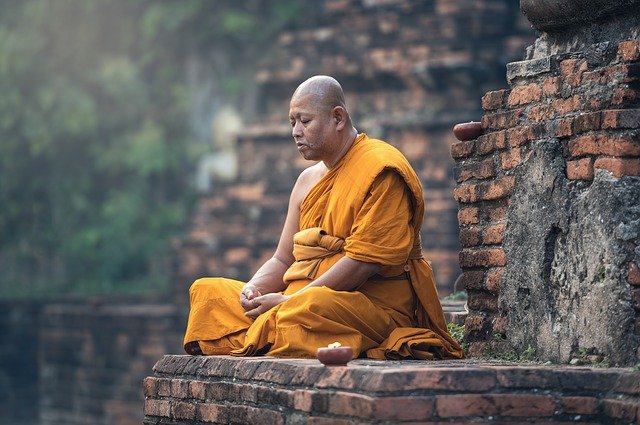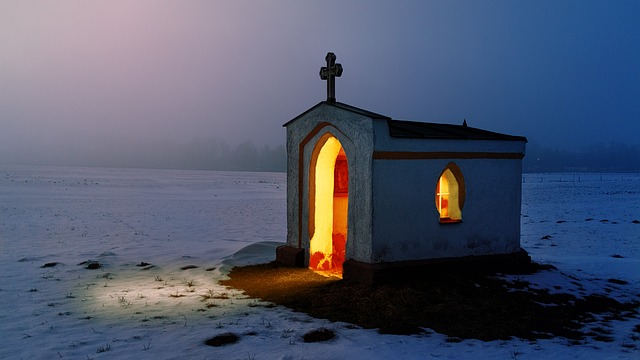
The question of whether qigong is a religion comes up from time to time, sometimes as a curiosity just trying to understand what it is, other times as a concern – particularly for those who have some kind of religious belief and are unsure of how qigong practice will intersect with that. In this article we will look at qigong’s relationship with religion both historically, and in more recent times, and hopefully satisfactorily answer the question of whether it is a religion or not. (TLDR: it isn’t, but you might still like to read the rest of the article to understand why sometimes people get the idea that it is, and how qigong might interact with and even enrich your experience of any religious beliefs that you have).
Early Origins of Qigong
Qigong has been practiced in one form or another for so long that it is not possible to identify a single origin of the practice. There are however stories about how some of the earliest practices developed and evolved.
In the Neolithic era, the people would mimic the movements of animals as they danced around their campfires. They observed that dancing as different animals affected their bodies and energy in different ways. This tied in with the animism of early Shamanistic belief systems – so you could say that there was some religious aspect to the earliest of qigong practices, but they quickly developed and evolved past this.
Closer observation led to an understanding that specific movements helped with different health problems, and this started to become codified within Chinese medicine. The effects on physical development were also noticed, and qigong became a valuable training tool for martial artists as well. Qigong practice quickly started to become a science as well as an art, and this knowledge was applied to all areas of life – including emerging forms of spirituality.
Daoism, Buddhism, and Confucianism
The history of China is interesting in that many of it’s religions were focused more on philosophy than the supernatural compared to religions in other parts of the world. The most predominant strands of these were Daoism, Buddhism, and Confucianism. For each of these there exists a spectrum of belief and expression, from the purely philosophical to the more superstitious and ritualistic.
Daoism focuses on the Dao – or the way of nature. Its expression can extend from simply seeking to understand nature and live in harmony with it, to belief in a multitude of deities with rituals and offerings.
Buddhism came to China from India in the first century CE, and its expression ranges from simply being a philosophy of finding peacefulness and acceptance of self and others, to a belief in buddhas or bodhisattvas as a kind of deity that can grant favours and has a kind of redemptive power.
Confucianism is a philosophy of social order, and this ranges from the simple and practical, to the belief in a more supernatural order and the need for rituals and ceremonies to maintain this.
Each of these strands of religious belief made use of qigong within their practices as a way to better understand or embody their philosophical aims. So much so, that even today we still have qigong practices that are commonly classified as Daoist, Buddhist, or even Confucian (although these are less common), because of the way they were used historically, or because of the elements of philosophy that may be woven into them to a greater or lesser extent. But in each of these qigong was very much a tool rather than the religion itself. It was, and is, entirely possible to be a Buddhist, a Daoist, or a Confucian without practicing qigong at all. Qigong practice was just a helpful aid in deepening the experience and understanding of each of these philosophies or religions.
Qigong, the Occult, and Superpowers
The results achieved through qigong practice can sometimes seem magical or even miraculous and this has led some to turn its practice into a quazi-religion itself, where the aim of practice is to achieve some kind of superpower or supernatural purpose. Often aspects of other spiritual or occult beliefs are also then mixed in with the qigong practice giving it more or a mystical allure.
For the most part these types of beliefs and practices exist in small pockets rather than being widely practiced, but from time to time they can rise to prominence. One of the most famous examples of this in recent history is the Falun Gong, also known as Falun Dafa – founded by Li Hongzhi and introduced to the public in 1992. They present themselves to the public as simply practicing qigong cultivation exercises – but further investigation reveals that Falun Gong is in fact a full blown pseudo religion. Quite aside from the unjustified persecution that Falun Gong has received from the Chinese government, qigong practitioners throughout China view Falun Gong very poorly because of the way they use qigong to lure people into their religion – reinforcing prejudices or misunderstanding of the nature of qigong.
What is Qigong Really?
So what is the true nature of qigong then? It’s practice dates back thousands of years and it has been used within religion but is not a religion. It has also been used in very practical ways within Chinese medicine and for peak performance within martial arts. Quite simply qigong is a different lens to observe the world through, and to learn how to interact with it.
A simple translation of the word qigong (氣功) tells us that qi (氣) means energy, and gong (功) means work or skill, so qigong means to work with and develop skill with energy.
In a way this brings us back to the earliest animist origins of qigong practice, and the idea that everything is filled with living energy. Early modern scientific thought has tended to be quite reductionist – looking at everything as individual inanimate parts, but more and more has begun to recognize that the nature of life is more than the sum of its parts. To really understand the richness of living experience we need to look at systems as a whole and the myriad of interactions that occur within them. A focus on energy helps us to take this broader view and to not only understand the parts, but the combined effect of all those interactions. Energy is the thing that runs through and connects the systems together.
In practical terms, qigong practice usually involves working with the mind, the body, and the breath together to gain a better understanding of the connection between our perception and intention, and the physical functions of our bodies, and to develop skill with this. This then extends into understanding and developing skill in our relationships with others and the environment around us.
Developing this subtle awareness and appreciation of the nuances of the function of our mind and bodies and our interactions with the world around us leads to many profound insights about ourselves and our place in the world. Is this spiritual? It depends on how you define the term, for some people looking at the stars in the night sky or watching a flower unfurl with the rising sun is spiritual – and whether you look at these through the lens of biology, chemistry, physics, or all of them together along with your experience of the energy of the moment, it is no less wondrous. Certainly you can see how this subtlety of perception can be a tool to support and enhance enquiry into any aspect of life.
Application to Other Religions
Over my years of teaching qigong, it has been interesting for me to observe people from different religious backgrounds responses to qigong. People from a very dogmatic religious background often choose not to engage with it at all, worried that it may somehow conflict with their religious beliefs. Others may practice but start to feel uncertain about their practice when they experience things outside of their normal perception. Because what they experience is unusual to them, they become concerned that maybe it is somehow supernatural, and that they may be drawing on some kind of power that could be at odds with their concept of God. Of course whatever we experience in our qigong practice is natural, it is just that there is so much more to nature than we often give attention to. These fears can usually be alleviated by digging a bit deeper to understand the origin of our natural experience.
In contrast, it has also been interesting to see people with a religious background openly embrace the new insights and experiences they gain from their qigong practice and to actively see how this fits in with their existing religious belief. Much like the Daoists, Buddhists, and Confucians of old, they use the practices to further support and enhance their understanding and experience of their religious beliefs. If they believe in a Creator, they recognize the value of rich experience and appreciation of nature and creation that they gain from their qigong practice. They also recognize the spiritual value they gain from understanding themselves more fully. It has been fascinating to hear how people from Christian, Jewish, and other religious backgrounds can draw insights from their qigong practice that supports them in their faith, and equally how those who are areligious simply draw a greater appreciation of their experience of life from similar experiences.
Conclusion
So, the question of whether qigong is a religion is an entirely understandable one. Qigong has been applied within religions both ancient and modern, and while practicing qigong people may have experiences that they consider to be spiritual or religious. But how you interpret these experiences is entirely up to the individual, qigong itself is not a religion, but rather a set of principles that gives us a lens to view ourselves and the world around us with greater richness and nuance as we tune into our experience of the living energy that flows through all things. This lens and the experiences gained through qigong practice can be interpreted in a way that is in harmony with any religion, or that simply enriches our experience of life.
Those from a religious background may wish to avoid groups that teach qigong interwoven with the teachings of a particular religion or philosophy – to avoid conflict with their own existing religious beliefs; but it would be a shame to miss out on all that qigong practice has to offer because some choose to mix it with religion. A good way to avoid these conflicts is to seek to really understand any qigong practice so that you can determine which parts of a practice are purely based on understanding and experiencing nature and the world around you, and when perhaps some religious philosophy may have also been mixed in. Long White Cloud Qigong’s Introduction to Qigong Theory and Practice course is a great place to start. It explores topics as fundamental as what qigong is, and how qigong practices work, as well as the history, origins, and application of qigong practice. It also includes some simple examples of qigong practices for you to try to help you really understand the principles discussed, as well as to simply enjoy the practices. The course is free and you can register for it here.
I hope you have enjoyed this article. If you would like to stay up to date with when we publish new articles and announcements, you might like to sign up for our email newsletter below to receive our latest news:





2 Comments. Leave new
Thanks John. Great explanation. I like to think of qigong as a Balancing of the self in this world of chaos! Just part of the the many balancing acts we do in life to keep ourselves centered and grounded.
Terrific article, John. As a philosophical practitioner of both Buddhism and Daoism, I must say you really pinpointed good information. I’ve observed in and out of China that Falun Gong is not welcome because of the religious component. Qigong is such a beautiful system of working with energy and nothing more has to be added or attached. Thank you for the in depth clarification.